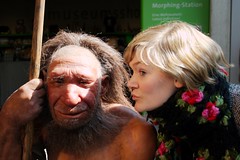Category: Ideas
Ideas, thoughts and concepts
Tasktop to improve a knowledge worker’s productivity
I’ve been using Mylyn for quite some years now. Mylyn introduced the concept of task-focused work: activate a task in your to-do list, and only see the files relevant to that task. Tasktop, the company behind Mylyn, extends Mylyn as Tasktop, with even more features, and promises “improved productivity, guaranteed.”. It works great when I am developing software, and also could support me as knowledge worker, for instance by managing bookmarks and browser tabs in Firefox. But I’d like to see it offer more support for task management within Firefox too. A bit like this.
Goodbye to the gatherers, welcome to the web: mammoths and modernity.
Imagine the first farmers: they lived in a society of hunters and gatherers. Every so often, you’d pack up your stuff and move along, to follow your food. Find new things to eat, because you’ve exhausted the place you lived in.
 The farmers introduced a new way of thinking: what if we could just grow our food in one place? That would save the effort of travelling around. So they started experimenting: sowing seeds, taking care of the young sprouts, trying to cultivate their plants. Until it was harvest time: reap the benefits of your labour, indulge in cornucopia for a while, store a bit, and start working on the next cycle.
The farmers introduced a new way of thinking: what if we could just grow our food in one place? That would save the effort of travelling around. So they started experimenting: sowing seeds, taking care of the young sprouts, trying to cultivate their plants. Until it was harvest time: reap the benefits of your labour, indulge in cornucopia for a while, store a bit, and start working on the next cycle.
The hunters and gatherers must have looked upon those folks as weird people: building houses ("sure, nice to live in but not very practical on your travels!"), creating ploughs and tools ("great way to move dirt, but how are you going to catch a mammoth or pluck a berry with that?"), storing food in storages ("won’t the mice and the rats just run with it?"). The hackers and nerds of their times, saying "go ahead and chase your mammoth, I’ll see you around, next Summer".
The farmers prevailed. They changed the way society works in most places on the world. We try to stick to where we are, and we even make rituals and routines around that, to affirm our convictions and location. And most of us are no longer involved in producing food, but rather in pursuing other goals.
I’m working in the field of international development collaboration. I often feel like a farmer, talking to hunters and gatherers, about what "web 2.0" is really about. Oh, he’s a techie, an engineer. But I’m experimenting with ways to grow compassion, engagement, collaboration. Online communities? Blogs and bookmarks? RSS and wikis? Social networking? Sure, but won’t the rats just eat your products while you’re having a party?
We don’t eat a lot of Mammoth Burger these days. And we could cultivate collaboration towards a common goal, without sacrifice or giving up (a lot of) our current live. We can build a global society based on solidarity, without loosing identity or community.
Lets move from chasing to cultivating.
(photo: CC-BY-SA-NC-20 by Poo-tee-weet?)
Flying saucers, flow and serendipity shape the web
Recently, my work has moved again towards "concept" and "facilitation", into the realm of the unknown, the things to be discovered. Especially around online collaboration, platforms to facilitate that, and internet strategies and architectures to support such processes: Web of Change, WijZijnMedia, NABUUR, Internationale Samenwerking 2.0 (in Dutch for now). It’s all about new community-organising strategies and tactics, and I love it: a potent mix of "where do we go from here" and "what will we have built by the end of today". Pragmatic idealism: punk+utopia with web 2.0+mobile as catalyst, or perhaps: "do it yourself serendipity". But also: how to let flying saucers get you there. Mihaly Csikszentmihalyi’s talk at TED and Matt Leacock’s Google Tech Talk guide me.
Curing “Data Hugging Disorder”
Last Friday, the 1%Club held their (first, probably not last) 1%EVENT, about “international development cooperation 2.0”. I facilitated a session on “connecting the platforms”, to pave the (technical) way towards a cure for what Ushahidi’s Juliana Rotich aptly referred to as “Data Hugging Disorder“. It resulted in a positive discussion with several people of organisations that build or host online platforms. Coming Monday, I hope the discussion continues at a meeting in The Hague about a possible Dutch IS-Hub.
A framework for “online social network models”
Aldo de Moor and I are rapidly approaching the end of our mid-week work retreat. The fresh sea breeze and the occasional glass of wine have helped us divide our attention between Real Work, and Serious Study. It resulted in an emerging framework or meta-model, with a few purposes:
- Advance our earlier modelling work with new insights, and assess where we think things are by now.
- Enable us to combine our years of experience in talking about various parts of the puzzle in a common structure.
- Provide an overarching framework to look at the various models we have come to use or see over time.
It’s very much still a work in progress, but while twittering about our progress, I got into a conversation (via Facebook) with John Bywater of the Appropriate Software Foundation, which helped me clarify a bit of my thinking. I met John just over five years ago at Summer Source, where he introduced me to the concept of pattern languages. At that time, it was still too abstract for me to apply in my actual work, but over the years, patterns have become more common-place, for instance in PHP programming and in wikis.
“Doing things together online”
Recently, a couple of events allowed me to look again at how groups of people “do things together online”.
I’ve had a chance to meet up a few times in a short period with Aldo de Moor, and that helped us reflect on where things have come since we first drafted the contours of our “social context model”, nearly ten years ago now.
Add a few potential projects in the pipeline that deal with global networks of people who should produce something together. And the opportunity to dive a bit deeper into the NABUUR concept, to see how it is still pretty unique.
Aldo and I quickly concluded that although a lot is happening, and happening fast, there actually has been little progress in what we see as the hardest part of (online) collaboration: supporting work flows. Sure enough, people find ways to use the techno-centric tools that emerge, and services like Basecamp are making inroads into this. But most platforms still have some way to go.
